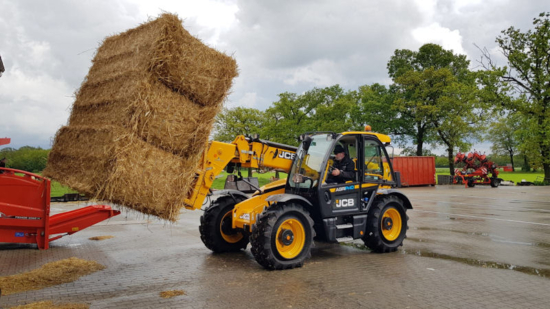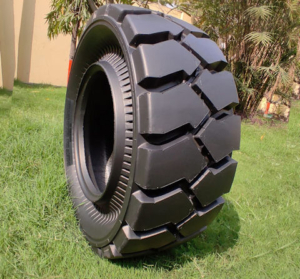Galileo CupWheel combines advantages of tyre & track
 Kirkby is currently testing Galileo products with partners in the UK (Photo: Kirkby Tyres)
Kirkby is currently testing Galileo products with partners in the UK (Photo: Kirkby Tyres)
When we met Avishay Novoplanski at a major agricultural fair prior to the first lockdown, he was holding a paper takeaway coffee cup and reflecting upon the utility of air. But he hadn’t just taken a caffeine hit, nor were his musings on the invisible, gaseous substance that surrounds us out of place. For Novoplanski is the inventor of the Galileo CupWheel, and this explains his interest in both.
Noting that the main purpose of all tyres is to reduce the vibrations transmitted from road to vehicle, Novoplanski describes air as a “wonderful” spring – it costs nothing, cannot break, doesn’t generate heat and no energy is lost when it is compressed and expanded. “The air-filled pneumatic tyre is a wonderful invention,” he exclaims. “The only problem is that this air must be contained inside an envelope, and this has certain limitations. If you want that envelope to give you some flexibility in a desired direction, at the same time it will be flexible in another, undesired direction. For tyres, this means that vertical suspension comes at the expense of lateral stability.”

Galileo CupWheel features a v-shaped sidewall that ensures good lateral stability and thus improves handling (Photo: Kirkby Tyres)
This is where the coffee cup comes into the picture. Squeezing the cup’s rim so that it is no longer perfectly round, Novoplanski comments on the high flexibility that this shape offers. Indeed, when squeezed and rolled it resembles a caterpillar track. But this flexibility doesn’t affect the shape’s stiffness in the other direction. “If it were a wheel, I could use air pressure to make it as flexible or as stiff as I wanted, but maintain stiffness in the other direction at all times.”
Novoplanski describes the CupWheel design as two inverted cups, or a v-shaped cross section. This creates a v-shaped sidewall that ensures good lateral stability and thus improves handling. At the same time, the CupWheel’s tread extends to create a longer footprint that is not dissimilar to a track yet maintains uniform pressure distribution like a radial tyre.
No trade-off
“The CupWheel is made using the same materials and equipment as a regular tyre and is mounted on a standard rim, but its properties are like those of a track,” comments the CupWheel inventor and chief technical officer & co-founder of Galileo Wheel Ltd. “You can have something that is similar to a wheeled track. It’s like a track, it is very flexible vertically, but laterally you have the same stiffness. The whole principle is that we break the correlation between lateral and vertical stability. There’s no longer a trade-off.”
CupWheel’s developer reports a number of advantages over regular tyres. In addition to greater productivity and yields with reduced soil compaction, Galileo says the solution improves ride quality, while the design and inner sidewall construction increases tread life. The tyre is drivable at zero air pressure, which means vehicles can return home in the event of a puncture, and repairs can also be performed on sidewall punctures. Galileo adds that CupWheel tyres have very good self-cleaning properties.
Local partnership with Kirkby Tyres
We first heard of the CupWheel concept early last decade when Galileo began a technical partnership with Mitas that resulted in the development of the PneuTrac solution. PneuTrac became a Trelleborg-branded product following the Swedish firm’s acquisition of Mitas parent company CGS Holding five years ago, but Israel-based Galileo Wheel also offers CupWheel directly. Its partner here in the UK and in Ireland is Kirkby Tyres.
When we spoke with Kirkby Tyres in June, marketing director Michael Rosenthal gave a Galileo progress update. He said the wholesaler is looking to bring four versions of CupWheel to the UK – AgriCup for tractors, TeleCup for telehandlers IrriCup for irrigation mobility and SkidCup for skid-steer loaders.
Kirkby is yet to begin selling Galileo products and is still in the product testing stage. Rosenthal nevertheless shares that feedback from test partners has been very positive so far.
“We have the popular telehandler size 460/70CW24 Galileo TeleCup 159B currently under testing at waste recycling yards along with the popular skid steer size 12CW16.5 Galileo SkidCup, which is under testing with large OEMs,” he reports. Initial results are “very impressive,” adds the marketing manager. While he didn’t say when Kirkby would begin stocking the range, Rosenthal points out that worldwide shipments of Galileo tyres have already commenced.




Comments